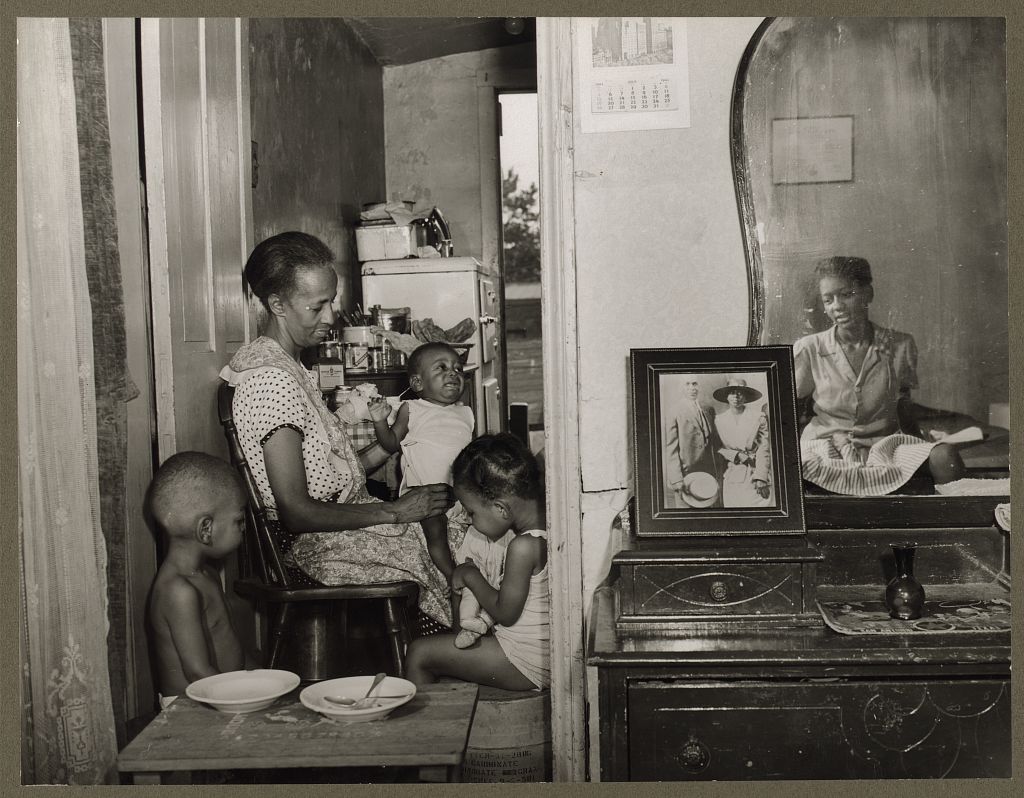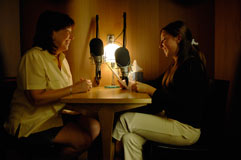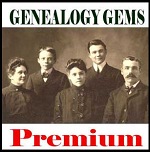by Lisa Cooke | Feb 16, 2014 | 01 What's New, Adoption, Beginner, History

Mrs. Ella Watson, a government charwoman, with three grandchildren and her adopted daughter [reflected in the mirror]. Image from The Gordon Parks Archives in the Library of Congress.
Formal, legal adoption wasn’t common in the U.S. until the late 1800s. (State adoption laws didn’t even exist until after Massachusetts passed the first one in 1851.) Before that, if mom and dad couldn’t take care of a child, a relative, neighbor or friend took that child in, or the child was sent to a county orphanage or poor home. In even earlier days, orphaned or poverty-stricken children were also sold by their towns into indentures.
The Adoption History Project at the University of Oregon has a great timeline of adoption history in the U.S. Check it out to see what was going on when your family member was adopted.
To learn more about adoption and genealogy research, check out these links:
FamilySearch Wiki U.S. Adoption Research
All About Adoption Research by Maureen Taylor
RootsWeb’s Guide to Tracing Family Trees: Adoption
by Lisa Cooke | May 3, 2015 | 01 What's New, Apps, images, Interviewing, Memory Lane, Oral History, United States
 Recently a friend sent me a link to a TED talk by StoryCorps founder Dave Isay. As a radio broadcast journalist, Dave has spent his life capturing other people’s stories. The profound impact this had on him led him to found StoryCorps, which collects and archives interviews with everyday people.
Recently a friend sent me a link to a TED talk by StoryCorps founder Dave Isay. As a radio broadcast journalist, Dave has spent his life capturing other people’s stories. The profound impact this had on him led him to found StoryCorps, which collects and archives interviews with everyday people.
“Every life matters equally and infinitely,” Dave learned, something we discover as family historians, too. He talks about how inviting someone to talk about his or her life “may just turn out to be one of the most important moments in that person’s life, and in yours.” This is something I try to explain to people about family history interviews: asking respectful questions and listening just as respectfully is a gift we can give our relatives when we interview them.
StoryCorps started with a little recording booth in Grand Central Terminal, one of the busiest places in the world to hold these intimate conversations. Two people share a conversation, one interviewing and the other being interviewed, and a facilitator helps them record the conversation and leave with a copy of it. Another copy goes to the Library of Congress.
In our own ways, we do this when we record loved ones’ life stories. We honor their feelings, experiences and opinions by asking about them and preserving them. Sometimes we share personal moments of understanding, forgiveness or revelation. In my experience, it’s similar to what unfolds in the StoryCorps booths: “Amazing conversations happen.”
In Dave’s TED talk, he shares snippets of some of those amazing conversations, like A 12-year old boy with Asperger’s syndrome interviewing his mother, and a husband sharing his love for his wife: “Being married is like having a color television set. You never want to go back to black and white.”
 StoryCorps now has an app that helps people capture conversations like these. A digital facilitator walks you through the interview process, the app records the conversation, and then you can save and share the resulting audio file. Why not record an interview in honor of Mother’s Day or Father’s Day this spring with the StoryCorp app? Or have a meaningful conversation with an aunt or uncle, sibling, cousin or your child or grandchild.
StoryCorps now has an app that helps people capture conversations like these. A digital facilitator walks you through the interview process, the app records the conversation, and then you can save and share the resulting audio file. Why not record an interview in honor of Mother’s Day or Father’s Day this spring with the StoryCorp app? Or have a meaningful conversation with an aunt or uncle, sibling, cousin or your child or grandchild.
 Genealogy Gems Premium members can learn more about preserving the stories of your own life in the Genealogy Gems Premium Podcast Episode 116, in which I interview Laura Hedgecock, author of Memories of Me.
Genealogy Gems Premium members can learn more about preserving the stories of your own life in the Genealogy Gems Premium Podcast Episode 116, in which I interview Laura Hedgecock, author of Memories of Me.
by Lisa Cooke | May 12, 2015 | 01 What's New, British, History, Records & databases
Was your ancestor the lord of an English manor or, more likely, someone who lived and worked in the vicinity of one? Or are you a Downton Abbey fan who would just enjoy reading the old records kept by a grand manor? Then you should know about English manorial records...
by Lisa Cooke | May 22, 2015 | 01 What's New, Records & databases
Every Friday, we blog about new genealogy records online. Might these collections include your ancestors? This week: Civil War stereographs, Dublin workhouse registers, Illinois naturalizations, a Jersey digital archive and Oregon motor registrations and offenses. Don’t miss our Google tip at the end!
CIVIL WAR STEREOGRAPHS. “The Library of Congress has acquired 540 rare and historic Civil War stereographs from the Robin G. Stanford Collection,” says a press release. “The first 77 images are now online, including 12 stereographs of President Lincoln’s funeral procession through several cities and 65 images by Southern photographers showing South Carolina in 1860-61. The images can be viewed in this gallery within the Library’s Prints and Photographs Online Catalog. More images will be added each month, until all are online.”
DUBLIN WORKHOUSE REGISTERS. More than 1.5 million Dublin workhouse registers, 1840-1919 are now searchable for FindMyPast subscribers. Records include both images and transcripts, and may contain names, marital status, occupation, religion, age, birth year, admission year, name of workhouse and (on images) details about family, condition upon admitttance and date left workhouse or died.
ILLINOIS NATURALIZATIONS. Over a half million digitized images are searchable for free at US, Illinois, Northern District Petitions for Naturalization, 1906–1994 at FamilySearch.
JERSEY HERITAGE DIGITAL ARCHIVE. Over 300,000 items are now searchable at the subscription website Jersey Heritage Archives & Collections Online. Featured collections include registration cards of 30,000+ Channel Islanders who were there during the WWII German occupation. You’ll also find Jersey parish records dating to 1842 and (under Superintendent Registrar) parish registers from 1540-1842 and post-1842 civil marriage records.
OREGON MOTOR VEHICLE REGISTRATIONS AND CONVICTIONS for 1911-1946 are now searchable by Ancestry subscribers. Registrations include license number, name and address of the vehicle owner (including county in parentheses), make of car, motor number, model or year of manufacture and type of body. Records of convictions name the offender, date, offense, license number, court, county and the amount of any fines.

Tip of the week: Whenever you look at any record of an ancestor, ask what additional documents, images, video footage or historical material this record points you toward. For example, you might learn from an above record that Grandpa drove a 1935 Auburn Speedster or that a relative suffered from the German occupation on Jersey. Google searches on these niche topics can lead you to a Speedster photograph or historical materials (including footage) on the occupation, like this interview with a survivor of the German occupation. Learn how to search for gems like these in Lisa’s totally-revised, updated 2nd edition of The Genealogist’s Google Toolbox.





